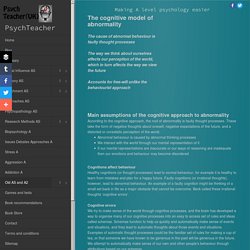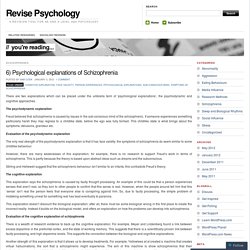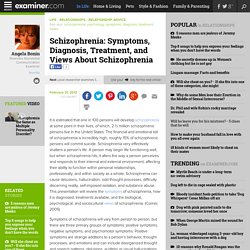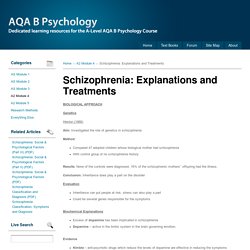

Gnitive approach to abnormality - A level psychology - Psychteacher. Main assumptions of the cognitive approach to abnormalityAccording to the cognitive approach, the root of abnormality is faulty thought processes.

These take the form of negative thoughts about oneself, negative expectations of the future, and a distorted or unrealistic perception of the world. Abnormal behaviour is caused by abnormal thinking processesWe interact with the world through our mental representation of itIf our mental representations are inaccurate or our ways of reasoning are inadequate then our emotions and behaviour may become disorderedCognitions affect behaviourHealthy cognitions (or thought processes) lead to normal behaviour, for example it is healthy to learn from mistakes and plan for a happy future. Faulty cognitions (or irrational thoughts), however, lead to abnormal behaviour. An example of a faulty cognition might be thinking of a small set back in life as a major obstacle that cannot be overcome. Revision_Guide_-_Psychological_Explanations_of_Schizophrenia.
Schizophrenia.pdf. Exam Practice or Schizophrenia – Cognitive Explanation & Therapy. Q1 – Outline and evaluate one psychological explanation for schizophrenia (24 marks) The cognitive approach is one way that schizophrenia can be explained.

The cognitive approach argues that schizophrenia is caused by faulty thinking, particularly how information is processed and how the individual reacts to it. Normally the brain can filter incoming stimuli and choose what information to retain and what to dispose, however those who have schizophrenia have too much stimuli to process and breakdowns in information processing, as well as having emotional problems attributed to the faulty thinking, which can lead to overgeneralizing, irrational beliefs, negative thinking and illogical errors. Due to the brain letting in too much stimuli it leads to symptoms such as lack of concentration, inability to correctly interpret information and having a very different world to those who do not have schizophrenia.
Q2 – Outline and evaluate one psychological therapy for schizophrenia (24 marks) Revision_Guide_-_Biological_Explanations_of_Schizophrenia. 6) Psychological explanations of Schizophrenia. There are two explanations which can be placed under the umbrella term of ‘psychological explanations’, the psychodynamic and cognitive approaches.

The psychodynamic explanation Freud believed that schizophrenia is caused by issues in the sub-conscious mind of the schizophrenic. If someone experiences something particularly harsh they may regress to a childlike state, before the ego was fully formed. This childlike state is what brings about the symptoms; delusions, grandeur etc. Evaluation of the psychodynamic explanation The only real strength of the psychodynamic explanation is that it has face validity; the symptoms of schizophrenia do seem similar to some childlike behaviour. However, there are many weaknesses of this explanation; for example, there is no research to support Freud’s work in terms of schizophrenia. Stirling and Hellewell suggest that the schizophrenic behaviour isn’t similar to an infants, this contradicts Freud’s theory. The cognitive explanation Like this: Behavioural-explanations-of-schizophrenia. Schizophrenia: Symptoms, Diagnosis, Treatment, and Views About Schizophrenia ...
It is estimated that one in 100 persons will develop schizophrenia at some point in their lives, of which, 2 ½ million schizophrenic persons live in the United States.

The financial and emotional toll of schizophrenia is incredibly high; roughly 15% of schizophrenic persons will commit suicide. Schizophrenia very effectively shatters a person's life. A person may begin life functioning well, but when schizophrenia hits, it alters the way a person perceives and responds to their internal and external environment, affecting their ability to function within personal relationships, professionally, and within society as a whole.
Schizophrenia can cause delusions, hallucination, odd thought processes, difficulty discerning reality, self-imposed isolation, and substance abuse. Schizophrenia: Explanations and Treatments. Genetics Heston (1966) Aim: Investigated the role of genetics in schizophrenia Method: Compared 47 adopted children whose biological mother had schizophreniaWith control group of no schizophrenia history Results: None of the controls were diagnosed, 16% of the schizophrenic mothers’’ offspring had the illness.

Conclusion: Inheritance does play a part on the disorder Evaluation Inheritance can put people at risk, stress can also play a partCould be several genes responsible for the symptoms Biochemical Explanations Excess of dopamine has been implicated in schizophreniaDopamine – active in the limbic system in the brain governing emotion. Evidence Kimble – anti-psychotic drugs which reduce the levels of dopamine are effective in reducing the symptomsIverson – Schizophrenics patients show high levels of dopamine in brain. Does excess dopamine cause schizophrenia, or does schizophrenia have an affect on dopamine levelsMay be that receptors in the brain are more sensitive.